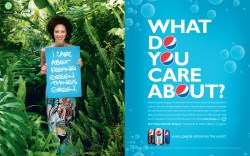The crackdown on super-sized sodas appears to be spreading. According to Businessweek, Cambridge, Mass., is now exploring the idea of limiting the portion size of soda and other sugar-sweetened beverages. This news comes just as several members of New York City’s Board of Health spoke out strongly in favor of Mayor Michael Bloomberg’s 16-ounce limit for soda sizes.
What will beverage companies will do in response? Well, let’s just say they’re a group that tends to play hardball. In fact, some public health advocates have compared soda companies’ recent marketing tactics and business strategies, developed in the wake of growing evidence linking sweetened beverage consumption and obesity, to those of tobacco companies. “Taking a page from tobacco’s playbook” is a phrase I’ve seen used more than once.
And while advocates stand by the comparison, there hasn’t been much rigorous analysis behind it to date. Trying to fill that gap, the peer-reviewed journal PLoS Medicine commissioned a series of reports to explore “the activities and influence of the food and beverage industry in the health arena.”
One interesting report from the series looks at the way soda companies participate in so-called “cause marketing” programs. Researchers examined programs like the Pepsi Refresh campaign, Coke’s Live Positively, and Sprite’s Spark Your Park. The goal of these programs is to demonstrate the companies’ roles as responsible corporate citizens who do good deeds — whether through crowdsourced philanthropy, “healthy living” tips, or improved playgrounds. In other words: It’s the warm fuzzy stuff.
As you may know, these efforts are similar to the way Big Tobacco spent its money in past decades. Companies like Philip Morris have a long history of investing in arts and culture to help burnish their images. But in the ’90s, when smoking was finally pushed to the margins and tobacco companies’ tactics came under fire, they pioneered the modern Corporate Social Responsibility (CSR) campaign — websites, marketing materials, and ads that were all purportedly designed to teach people how to use their products responsibly. (Or in the case of kids and teens, to teach them how to avoid the products entirely.)
However, “public officials, advocates, teachers, and students opposed these [Big Tobacco] programs, which backfired because they were perceived as cynically employing reverse psychology to encourage youth smoking.”
Now, what the tobacco companies were doing was truly heinous. And there’s nothing illegal about selling soda to kids. But soda company executives admit that these are less philanthropic efforts than alternative marketing campaigns designed to boost sales. The study reads:
According to Shiv Singh, a marketing officer for the Refresh Project, the campaign is “not a traditional non-profit corporate philanthropy effort that we just go write checks. It’s putting the DNA of doing and feeling good at the core of a brand marketing effort.” Moreover, while the initiative is publicly presented as supporting charitable causes, the program was not funded with “corporate philanthropy dollars” but with “brand marketing dollars, because we believed fundamentally and still do that, you know, by doing good in a way that’s aligned with our Pepsi brand values, you know, we can help the bottom line.
… Crucial to PepsiCo’s bottom line, when Millennials, the [Pepsi Refresh] campaign’s key demographic target, know about the Project their purchase intent goes up.” Such soda CSR programs focus strategically on this cohort of 11- to 31-year-olds to build brand preferences from an early age and create a climate in which drinking soda is viewed as a natural, frequent activity.
These companies are not afraid to push the boundaries. In fact, if there’s a particularly disconcerting element to soda company CSR campaigns, it’s that many seem designed to get around restrictions on selling soda in schools. As the report observes: “While soda companies agreed to remove full-calorie drinks from U.S. schools, CSR programs like the Refresh Project keep the brand in front of young people with promises of grants for children’s schools, parks, or other programs.”
Meanwhile, the overall tone of these campaigns shares several similarities with their tobacco company brethren. The campaigns focus on consumer responsibility and reinforce the idea that if you’re unhealthy it’s because you’ve made bad decisions; it has noting to do with their product.
But that’s not all. CSR and cause marketing, the report asserts, “are potentially a powerful mechanism to forestall regulation.” Philadelphia provided a perfect and ridiculously explicit example of this when the American Beverage Association donated $10 million to a local hospital’s anti-obesity effort as a successful means to convince the Philly City Council to kill a proposed soda tax.
Indeed, the researchers concluded that soda companies have a much better shot than tobacco companies had at staying in the good graces of consumers — and one look at The New York Times‘ editorial page fulminating against Bloomberg’s proposed soda ban should be enough to convince you they’re right.
Anti-soda advocates have a tough job ahead of them. But it’s also clear that Big Soda sees itself now where Big Tobacco was a few decades ago — and it thinks it can succeed where Big Tobacco failed. But keep in mind that these companies frankly admit that they’re not giving money to communities and causes out of the goodness of their hearts, but out of the desire to make sure you — and especially your kids — keep drinking plenty of soda.





